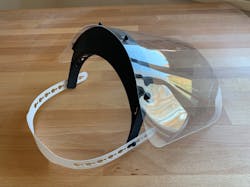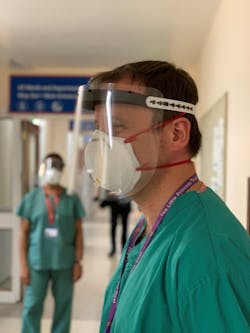University engineers laser-process certified face shields
Engineers at the University of Nottingham designed a personal protective equipment (PPE) face shield with CE Mark approval that they 3D-printed for healthcare workers to use in the fight against COVID-19. The University’s Centre for Additive Manufacturing, working with external collaborators, will deliver 5000 of the face shields to Nottingham’s NHS and community healthcare workers.
Using an open-source headband design, originally from HP, the Faculty of Engineering team made modifications to ensure the face shield that successfully passed a regulatory test by BSI, the UK’s national standards body. The face shields are CE Mark-approved for use as part of PPE for healthcare workers’ protection against COVID-19 in both hospital and community environments. They are provided in packs to the NHS, with five replacement visors per face shield as well as instructions for use.
The team has made the design and its accompanying documents ‘open-source’ to enable other manufacturers to produce the face shields—however, manufacturers will need to submit their product for testing to the BSI to obtain their own CE Mark certification. This face shield is not a PPE device for general use and should not be used for purposes other than protection against COVID-19, as it has been manufactured for this purpose only.
Professor Richard Hague, Director of the Centre for Additive Manufacturing, says, "Using the flexibility of additive manufacturing (3D printing) and laser cutting technology, we’ve been able to arrive at a design, get it tested and approved, and then manufactured and delivered in a very quick timeframe.” He praised the teamwork and willingness of people to helped them to contribute to the nation’s fight against Coronavirus.
The HP design was chosen by the Nottingham engineering team because it incorporates a cover at the top of the face shield, which prevents fluid from entering the eyes from above—deemed critical by healthcare professionals. The face shield comprises a 3D-printed headband, a laser-cut polyethylene terephthalate (PET) visor with anti-fog coating, and is kept in place with a laser-cut adjustable strap. As well as using their own EOS laser sintering equipment, the University of Nottingham’s engineering team has been heavily supported by Matsuura UK to produce the 3D-printed element, using their HP MultiJet Fusion process. The visor element has been made with the help of local firm Prime Group, and Nottingham Trent University is now ramping up for production of the laser-cut strap.James Hopkinson, Local GP and Joint Clinical Chair of NHS Nottingham and Nottinghamshire CCG, stated, “We are extremely grateful to the University of Nottingham for developing and supplying the visors, which will make a real difference to thousands of healthcare staff working on the front line of the Coronavirus outbreak. Packs of the face shields have already been delivered to local GP practices, and we have plans in place to share them with a range of other key workers such as people who care for others at home.”
For more information, please visit nottingham.ac.uk/cfam.
Source: University of Nottingham press release – April 29, 2020

